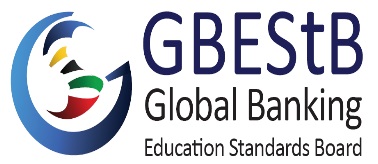The GBEStB is a voluntary, industry-led initiative founded by 25 of the world’s leading banking institutes. The major objective of the GBEStB is to develop and encourage the adoption of clear, internationally agreed standards for the education of “Professional Bankers” - a term which we define as “individuals subscribing to the relevant education programme(s) of a GBEStB member institute”.
GBEStB Objectives
The major objective of the GBEStB is to develop international, ethical and professional standards and guidance for use by banking institutes and others involved in the education and training of bankers. Specifically, the GBEStB aims at:
Education Standards Setting: Developing and publishing global education standards for banking institutes, and similar bodies;
Advocacy of Standards: Promoting and disseminating global education standards for banking institutes, and similar bodies;
International Cooperation: Facilitating the sharing of global best practice in banking education between banking institutes, regulators and other stakeholders; and
Research and Development: Conducting educational research into topics relevant to global education standards for bankers.
The GBEStB is not being established as another regulatory body. Rule-making is not part of the GBEStB’s remit. The intent of the GBEStB is not to establish an international ethical code, international technical standards (e.g. credit, risk) for banks or bankers, or similar, but rather to create opportunities for banking institutes to share developments and good practice in professional banking education and competency development.
GBEStB's Activities
In terms of Education Standard Setting, the GBEStB will:
Identify areas for standards development based on requests/recommendations from stakeholders or through other means in the context of developments taking place in the banking industry;
Establish and develop standards and guidance for use by member bodies in their education programmes for banking professionals;
Publish standards on professional banking education to establish voluntary industry benchmarks; and
Guide and shape member bodies’ professional standards and education programmes.
In terms of Advocacy of Standards, the GBSEStB will:
Facilitate world-wide industry and regulatory recognition of professional banking education, the GBEStB's education standards, and, where possible, the banking education programmes of its member institutes; and
Identify and develop partnerships with other organisations with an interest in the professional education and training of bankers (e.g. the World Bank, IMF, Financial Stability Forum, European Banking Authority, Bank for International Settlements), and build links with leading academic institutions with expertise in the field.
In terms of International Cooperation, the GBEStB will:
Organise the annual World Congress of Banking Institutes, and other world-class conferences and seminars;
Organise regular meetings for member bodies and others to discuss and revise the GBEStB’s standards and guidance;
Share ideas and lessons for enhancing and advancing the banking profession with educators, policy-makers, regulators, banking associations and others through networking and partnerships;
Help banking institutes in developing nations develop and deliver world-class professional education programmes for their members; and
Facilitate the exchange of information to ensure members are adequately informed, trained to meet their responsibilities and, wherever possible, to be able to contribute towards the objectives of the GBEStB; and
Provide a forum through which banking institutes may work bilaterally, multilaterally and internationally to achieve mutual recognition of professional banking education programmes.
In terms of Research and Development, the GBEStB will:
Explore and encourage research into the impacts and implications of global banking developments and trends that will shape the professional education of bankers;
Conduct and commission research on developments in professional education standards and practice; and
Drive research activities that may shape the future agenda of the development of the banking profession, involving multi-disciplinary research through close collaboration and partnership with banking institutes, universities, regulators and other key stakeholders.
As a new initiative and organization, beginning with very limited resources initially, and relying on the support of its founder members and sponsors, the GBEStB will need to prioritize its activities to focus on those that deliver greatest impact and value to its members and key stakeholders. Our initial focus, therefore, will be on developing and encouraging the adoption of international education standards for bankers, including a basic standard of competence and an ethics education standard.

